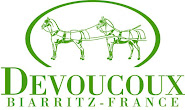We're back at Three Days Three Ways for Part II of the interview with Jo Whitehouse and Kevin Baumgardner, CEO and President of the USEA (United States Eventing Association). We left off with Kevin talking about how he got involved with the USEA in the first place (volunteer, volunteer, volunteer!). Today Jo starts us off with the flurry that is her typical day and the destiny of the long format. Kevin takes it from there with some of the intriguing, creative, and out-of-the-box ideas eventing organizers are coming up with.
Q. What is your daily life like at the USEA headquarters?
A. Jo Whitehouse: Well, that’s the fun part of it. You come in the morning and you have your schedule and will do this, this, this and the phone starts ringing and the emails start coming and it never turns out that way. It’s one of those jobs that you wake up and say that you will never have to work again. You’ve got to face some ups and face some downs but you meet some wonderful people, and I have to say eventers are the salt of the earth. The board meets three times a year and one is by teleconference, then we have the may meeting and we have a face-to-face meeting here in Leesburg in August and two meetings at the annual meeting (one of old outgoing board and one of the new). The board is on a rotational basis: two, three-year terms. So one third of the board will rotate every three years so you never have an entire board going off and a new one coming on so there’s continuity. As president you can serve thee, one-year terms. There are quite a lot of committees; each staff member is a liaison to one committee or more.
I’ve got to promote the sport and represent the association. We have the legal side of it, making sure legal documents are in place and legal requirements are met on regular basis, tax papers filed and other documents that have to be in place as a natural part of running an organization.
Fundraising is a part of my job. Right now we’re funding for the cardiovascular study and the frangible fence technology study. David O’Connor has been heading that up through University of Kentucky with the USEF (United States Equestrian Federation). The USEA has committed $30,000 this year and next year. We’re raising funds for that. We’re working on developing sponsorships and at the American Eventing Championships (AEC) where we’ll be presenting $50,000 prize money and $100,000 in in-kind prizes. We do a lot of sponsorship development for that.
As far as classic program, according to our members, they want to do it. It’s going to, probably, be an adult-amateur competition in the end. What we hope to do with the classic is to combine the Training level three-day as an educational activity and combine the two levels under the name of the classic series. Jim Wofford hopes it will go all the way up the levels. It will be a bit of a different sport since it won’t be where mainstream international competitors are going. But our 14,000 members, are in support. It will depend on the number of entries these events get. If the entries come, and members want it, we will do everything in our power to make sure it’s there for them to do.
And as far as funding it, as a national organization we can do fundraising along the lines of what we do with the Gold Cup. We have organizers who have agreed to participate in the Gold Cup, our sponsors love the Gold Cup as it gives them multiple chances for exposure. SmartPak is the title sponsor for the Training level and we’re looking for a Preliminary level sponsor. Stackhouse Saddles will put one saddle up and all the winners of the Training three-day will put their name in their hat and draw the winner. We have a website that gets hundreds of thousands of hits, e-newsletters, we can give the organizers the national outlet for their sponsors. And we’re always open to ideas for how we can do more. These are the things that make up my day!
Q. What is one of the most memorable emails you’ve received from a USEA member?
A. Kevin Baumgardner
One thing that does stand out, and relates to what we’re talking about, is people really want to see the sport continue as something that is unified and for people at all levels and not just a stratified pursuit where you have a few people at the show and everyone else is treated as clients. Everyone wants to be part of the action. Let me give you an example that got people really excited:
This Spring at Woodside Horse Trials at the beautiful Horse Park at Woodside on a hill looking over San Francisco Bay, Robert Kellerhouse and Christina Grey put on a competition so out of the box. Their event went through Advanced but what they decided to do was feature Preliminary. They called it the Preliminary Challenge, and put prize money on it. What they did that was so neat. Saturday night they had a big catered dinner in the main arena and invited everyone from the event and community. So you have all these people several tables deep and then watching the finals of the preliminary showjumping. The tension: it was like watching Rolex. It was so exciting. People were going wild. It really revved people up. I got tons of email about that. We’re focusing on the fun at every level. I think that’s want they want-fun and challenge at every level. It’s a sport that’s leveling and you won’t always come out on top.

Kevin Baumgardner and wife, Gretchen
photo courtesy of Kevin Baumgardger
One thing that distinguished our sport is we ride all the time against top riders like Amy Tryon or Karen O’Connor. I think it would be interesting if you showed up at Hunter-Jumper competition and said, “I’d like to ride against Beezie Madden.” That egalitarian quality is something people love. I think it draws us together.
Q. What is your history with horses?
A. Jo Whitehouse
Oh, well, you don’t want to tell anyone this: The gypsies would tether their horses on the open land. I disappeared and my parents found me sitting under this big Gypsy Vanner stroking its long feathers.
That's all I ever wanted. I would stand at the gate all day and one day they said to come in. I was like a barn rat. Allen Taylor was the owner of this riding stable in edge of the Yorkshiredales. I did Pony Club and Prince Phillip Pony Club Games and took my Pony Club B and all of those good fun things. I was involved with horses pretty much all my life. Then of course finished school, got married started a family and my daughter got involved with ponies and pony club and I became the D.C. of a Pony Club in New England and that’s when I started with the USEA. Then my daughter's eventing career took hold; she’s also a graduate A. Having to sit and listen to all the questions and those things that parents do. And then I was her groom. I can screw in studs and I’m very good at trot sets!
Q. Describe your first meeting with a horse. How old were you?
A. Kevin Baumgardner
Other than I may have ridden a pony in a circle at a fair, the first time I rode a horse I was 30. That was 1989. I’m 50 now. I was into mountain climbing, as was my wife. She (Gretchen) suggested we take a riding lesson, so we did. That was 20 years ago. I think a lot of people recognize this story. Slowly we got more and more into riding and then we discovered eventing. Remember in 1992 there was the thing called the triple cast, you could watch everything with the red, blue and white channel. It was ahead of its time. We watched all 8 hours of the eventing cross-country and I said I’d like to do that. So we did. We got involved and were lucky to meet some really good people and trainers and just like anyone else: you get bitten by the bug.
We have three horses right now; one is retired. He’s 20 now. He was a wonderful horse for me. He’s a member of the family. Then we’ve got two horses I’ve been eventing with, one had a suspensory last year. The other one, last weekend, we went Intermediate at John Camlin’s Caber Farm.
Rebecca Farm is nine hours away, in Montana, it’s an unbelievable place. We have Jonathan Elliot at Aspen Farm in Yelm, WA. Inavale Farm in Oregon near Corvallis, that’s a wonderful event. Whidbey Island, which has been run for over 30 years now, that’s an event that all of us have done many times and then North West Equestrian Center has traditionally had a Spring and Fall Event. The thing that we’ve got too is more and more interaction with the Californians. They have several wonderful events like Twin Rivers, Galway, Ram Tap in its 51st or 52nd year. Bill Burton: he’s a legend out here. There’s a lot of back and forth. Derek De Grazia is out here as is Malcom Hook. It’s a really good community out here on the West Coast.
Check Back to Three Days Three Ways for the wrap up to the interview with Jo Whitehouse and Kevin Baumgardern of the USEA and to find out what happened to the long format, and what you can do about it.









No comments:
Post a Comment